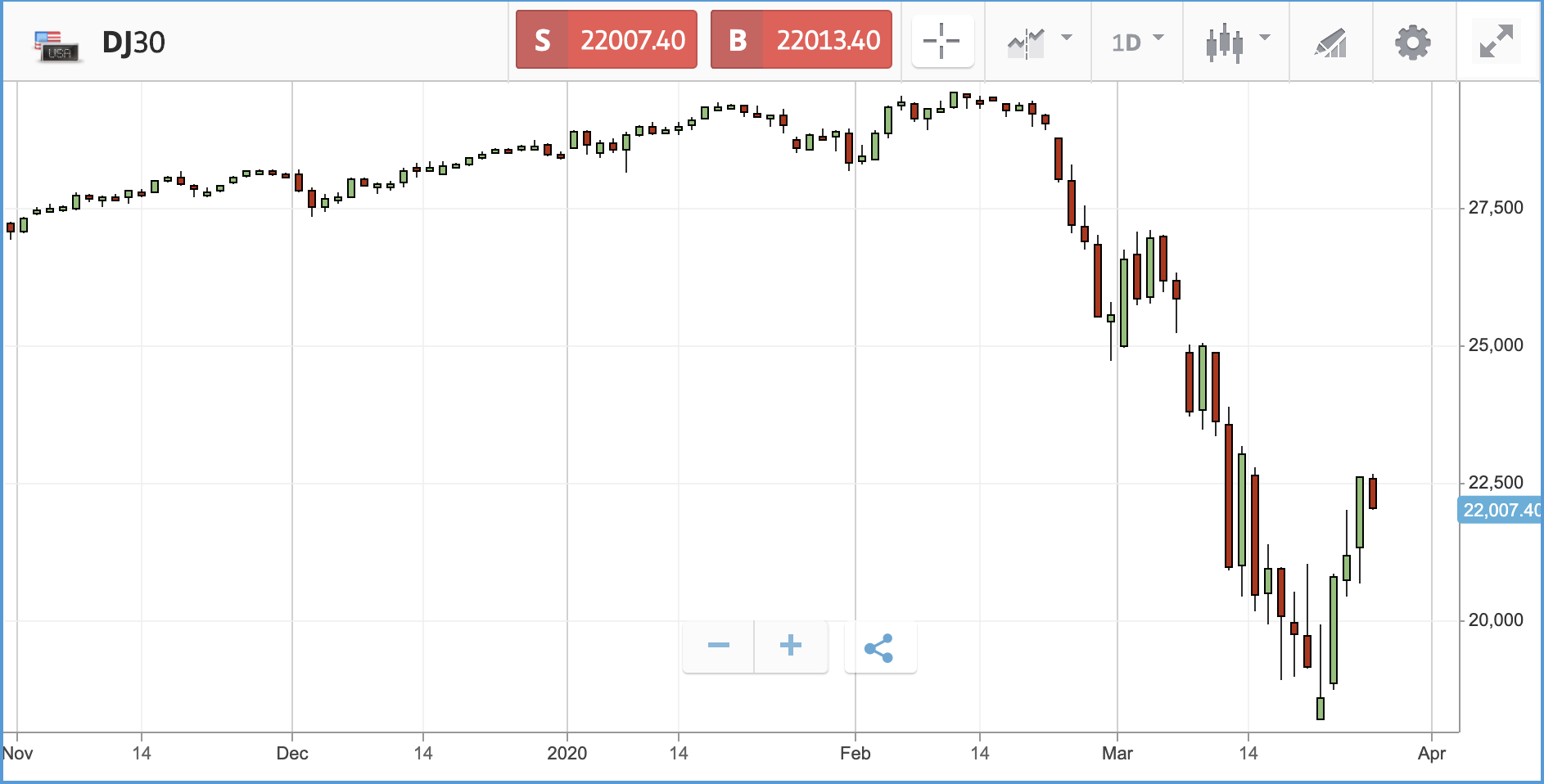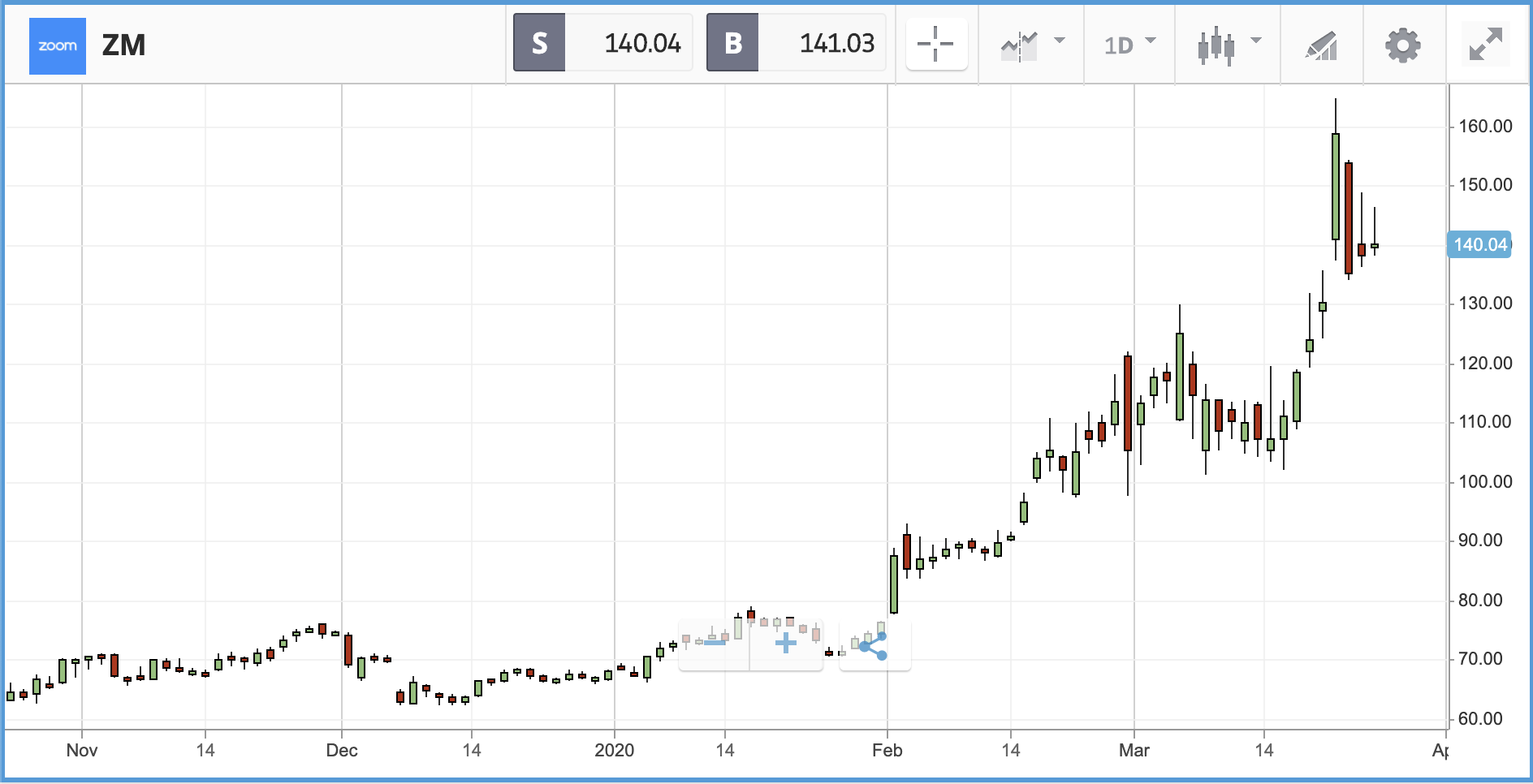Markets have finally faltered this morning after a stunning three day rally fuelled by unprecedented global stimulus measures. Germany is down 1.5% and the FTSE is down twice as much with a 3% dip. Travel is once again leading the losses, but housebuilders are also dragging on the UK as the government discourages Britons from moving house during the outbreak.
US futures are showing 1.5-2% losses technically, after rising by around 6% on Thursday, all three of the major US stock indices were out of a bear market (albeit very briefly). Yesterday, the Senate voted through the $2trn stimulus package that will now be voted on by the House of Representatives, where it is expected to be approved.

It wasn’t all good news yesterday though, weekly initial jobless claims came in at more than three million, up from 281,000 last week, as a wave of layoffs — especially in the hospitality industry — hit the US in the wake of a near nationwide lockdown. The figure was towards the higher end of the anticipated range, and became the largest on record by a massive distance; the previous record was 700,000 in one week in 1982. “Record is not even the right word here … these numbers are literally incredible,” one economist told Business Insider.
In addition to this, the US has now overtaken China to have the most coronavirus cases globally and is still rising, arguably the worst is yet to come in terms of impact of the outbreak across the pond. There has been heavy criticism of President Trump’s handling of the virus with some saying he has not taken it seriously, particularly referring to sourcing important medical equipment. In the face of this, one has to ask whether, even despite all the stimulus, a worsening situation in the world’s largest economy could present choppy times ahead for markets.
SEC steps in as investors mix up Zoom stocks
While stock markets rallied, $26bn market cap activewear brand Lululemon Athletica said that its business had been slowed substantially by the pandemic during March, as its stores are closed with the firm still paying staff. The company did not provide financial guidance for the year, but is sitting on $1bn in cash and no debt, and for the three months to February grew revenues by 20%.
In other corporate news, the SEC had to suspend trading in a small Chinese firm called Zoom Technologies, which investors had confused with video-calling app Zoom that has enjoyed huge adoption rates since the pandemic began and large numbers of people started working from home. Zoom Video Communication, the correct stock, has more than doubled its share price since the beginning of the year, and now sits on a $40bn market cap.

Of the three major stock indices, the Dow Jones Industrial Average climbed farthest on Thursday, gaining 6.4%. The index was led by Boeing, Chevron and Walgreens Boots Alliance, which all climbed double digits. Boeing soared 13.8%, taking its gain over the past five trading sessions to 84.8%, as the stimulus package passed with $88bn set aside in aid for the aviation industry. Apple stock gained 5.3%, meaning that, despite facing mass store closures and supply chain problems, the smartphone giant’s share price is now down just 12% year-to-date, and up 36.9% over the past 12 months.
S&P 500: +6.2% Thursday, -18.6% YTD
Dow Jones Industrial Average: +6.4% Thursday, -21% YTD
Nasdaq Composite: +5.6% Thursday, -13.1% YTD
FTSE climbs as government tacks on support for the self-employed
Both the FTSE 100 and the FTSE 250 climbed higher on Thursday, although both still remain in a bear market. Yesterday, Chancellor Rishi Sunak added support for self-employed workers to the UK’s coronavirus response. Self-employed workers will be able to apply for a grant worth 80% of their average monthly profits up to a maximum of £2,500 a month, to be paid in a single lump sum. The UK government also chose to freeze the housing market, asking buyers and sellers to move dates; banks have pulled huge numbers of mortgages from the market as they have been inundated with customer requests for payment holidays, while facing valuation difficulties and legal uncertainty. In the FTSE 100, which gained 2.2% on Thursday, Rentokil Initial, Legal & General Group and Standard Life Aberdeen were the top performers, with all posting double digit gains. This week Rentokil has halted its dividend, and warned of a more significant blow to its second quarter performance than it had initially anticipated. The news sent its stock tumbling double digits on Wednesday morning, but the stock has since bounced back to a double digit gain over the past week, with investors optimistic about increased demand for disinfection services — something the firm is training staff to meet.
FTSE 100: +2.2% Thursday, -22.9% YTD
FTSE 250: +3.8% Thursday, -29.7% YTD
What to watch
Consumer data: Friday sees a wave of data released on consumer sentiment and the state of personal finances in the US. Personal income and personal spending figures will be released for February. As with other February data, it misses the most serious period of the pandemic disruption, but all eyes will be looking for early indicators of what the disruption is doing to people’s spending habits. While travel and restaurant spending is ultimately likely to fall through the floor, extra spending on household goods, groceries, medical goods, and other items linked to working from home are likely to feed through. The University of Michigan’s final Consumer Sentiment Index for March will also be released; the preliminary figure for March came in at 95.9, down from 101 in February. Richard Curtin, the chief economist behind the survey, noted that “the initial response to the pandemic has not generated the type of economic panic among consumers that was present in the runup to the Great Recession.”
UK house prices: On Friday Nationwide will also release the March iteration of its house price index, which will be one to watch given the huge disruption the housing market has faced. That, as detailed earlier, has caused the government to effectively suspend the housing market in the UK. The decision was only taken late this week, so won’t have fed through into the data, but the underlying issues that caused the government to take such action may have. Banks have pulled out of lending, while buyers and sellers have been unable to hold viewings, and many potential buyers are now staring down the barrel of economic and employment uncertainty.
Crypto corner:
Crypto was a mixed bag on Thursday, flat for the most part in early trading today, despite swings in between.
Bitcoin surged, reaching $6834.83 late last night before trading back down to around $6700 this morning. Ethereum sank during the day to $132.22 before surging late on, up to $139.80, and is trading back around $136.63 this morning. XRP had the best of it, trading low around $0.16 all day before a big surge late on to reach $0.1776. XRP is now around $0.1724 early on today.
CME Group, one of the exchanges where traders can buy and sell bitcoin futures and options could be about to enter the world of bitcoin mining. One of their board of directors nominees, Dante Federighi, believes that this will create additional revenues for shareholders and likened the mining process to their own business of matching and clearing trades, intimating that much of their current competencies could be transferred into the new venture.
All data, figures & charts are valid as of 27/03/2020. All trading carries risk. Only risk capital you can afford to lose.

